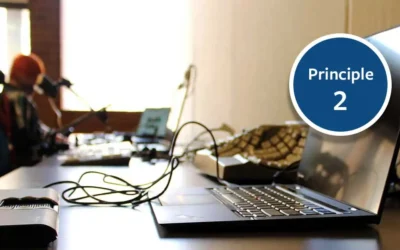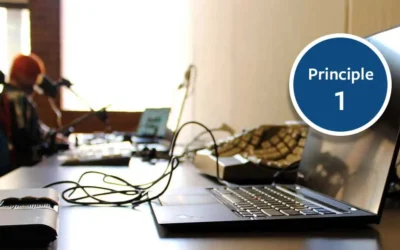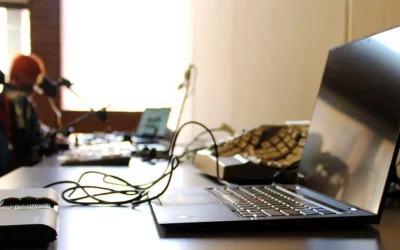Museum Digital Project Consultant: Training

Rachael Cristine Woody
As covered in earlier posts in this series (the Museum Digital Project Consultant series), museum digital projects are projects that contain at least one digital element. This post will outline where a consultant can support museum digital project staff with staff training.
Museum digital projects are projects that contain at least one digital element. Digital elements can be digitization, working with digital files, cataloging in a CMS, and publishing digital content online. The purpose for these projects can be a mixture of preservation and access, and even if there are some non-digital tasks to the project, the overall project is considered a digital project. The composition of museum digital projects can vary greatly. With this variability in mind, this series will highlight several digital project types where working with a museum consultant can be beneficial. Each post in this series describes the project type and activities involved, and outlines how a consultant can help support the museum staff. This series reviews the following project types:
- Assessing digital collections and making recommendations;
- Creating a digital project framework;
- Providing project management for a museum digital project;
- Selecting and implementing a museum Collections Management System (CMS); and
- Delivering digital collections training to museum staff.
When to Consider a Consultant
Consultants are experts in specific areas of museum work. This means that in addition to possessing knowledge and experience in specific areas of work, they also have a wealth of experience working with different sizes and types of museums. Your museum should consider working with a consultant if any of the following are true:
- The expertise needed isn’t presently available on staff.
- The staff don’t have enough time (capacity) to take on the specific activity or project.
- The project has never been done before.
- The project is highly specialized or contains areas of work that are highly specialized and need outside expertise.
Digital Project Consultant Service: Training
Depending on the area of digital project work, museum staff may require additional training in order to accurately complete their tasks. In instances where museum staff may have little or no experience with a particular digital project process, tool (equipment), or product (software); bringing in a consultant is a necessity. Here are a few example areas where a consultant training can be of benefit to staff, volunteers, and interns:
- Learning the process and best practices for digitization
- Learning the process and best practices for file management and preservation
- Learning the process and best practices for object data capture via spreadsheet
- Learning the process and best practices for cataloging within a CMS
- Learning the process and best practices for how to use any given CMS product
Examples of Where a Consultant Can be Helpful
Consultants who can provide training in any of the above area, can also help the museum staff create any process flows, templates, and instruction guides that can be used for reference both during and after the training. Once the instructional documentation meets the museum’s project needs the consultant can provide further detail and examples so that museum staff can reference both the instructional text as well as a topically appropriate (to the museum collection) example. Once the instructional materials and examples have been created, the consultant can build a training course for staff that leads them through the documentation and allows them to engage with the content and the consultant in real-time. If the training is delivered remotely via Zoom (or similar), these trainings can be recorded and made available for staff to use and reference throughout the duration of the project.
Conclusion
Training is the last element critical to a successful digital project and is where using a consultant can yield a high Return on Investment (ROI). The more staff learn and grow confident in best practices, process, and tools, the more effective they will be at their jobs. Furthermore, the materials the consultant generates as a part of providing training can be used, referenced, remixed, and adapted as the museum sees fit. Trainings are no longer a “one and done” event. Instead, training is a permanent investment in building staff knowledge —with shelf-life of the training material much longer than the training event itself.

Rachael Cristine Woody
If you’d like to learn more about this topic, register here for Rachael’s webinar, “How to Work with a Consultant on Museum Digital Projects” on September 28, 2022. Ms. Woody advises on museum strategies, digital museums, collections management, and grant writing for a wide variety of clients. In addition to several titles published by Lucidea Press, she is a regular contributor to the Think Clearly blog and an always popular presenter.
Never miss another post. Subscribe today!
Similar Posts
Museum Collections Online with Accessibility Principle 2: Operable
Compliance with WCAG Version 2.1 Principle 2: Operable
Museum Collections Online with Accessibility Principle 1: Perceivable
Compliance with WCAG Version 2.1 Principle 1: Perceivable, affecting information published from museum CMS to an online portal; expert guidance
Accessibility Standards for Museum Collections Online
A museum’s compliance with the ADA Title II 2024 update has benefits for its online content and for the museum’s community of users.
Museum TrendsWatch 2024: Digital Twins and Doom Loops & Combatting the Loneliness Crisis
Digital Twins is the construction of a digital surrogate for a person, place, or thing—one of several new concepts and trends in the museum sector.




Leave a Comment
Comments are reviewed and must adhere to our comments policy.
0 Comments